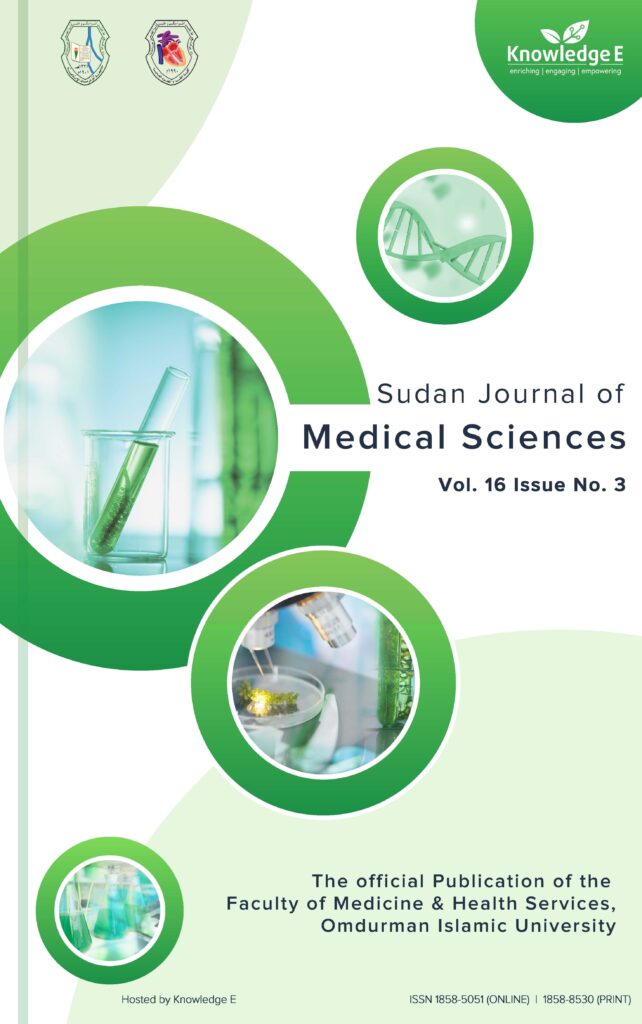
Sudan Journal of Medical Sciences
ISSN: 1858-5051
High-impact research on the latest developments in medicine and healthcare across MENA and Africa
The Effect of Neonatal Training Programs on NICU Nurses’ Knowledge and Practice in the Military and Police Hospitals of Khartoum State, Sudan
Published date:Mar 31 2022
Journal Title: Sudan Journal of Medical Sciences
Issue title: Sudan JMS: Volume 17 (2022), Issue No. 1
Pages:28 - 38
Authors:
Abstract:
Background: Hypothermia in neonates is a life-threatening condition. It happens due to the extrinsic thermal variations that contrast the intrauterine area. Early detection methods such as increased awareness and good nursing care play an important role in the prevention of hypothermia in newborns and reduce the consequences and death resulting from it. This study aimed to evaluate the effect of training programs on nurses’ knowledge and practice with respect to caring for neonates with hypothermia.
Methods: This quasi-experimental study was conducted in the military and police hospitals in Khartoum State, Sudan. A total of 47 nurses meeting the study inclusion criteria and agreeing to participate were included. The necessary research data were collected using a structured interview and a checklist pre and three months post intervention. Training program on neonatal hypothermia was offered to nurses which included the definition, causes, signs and symptoms, and treatment and prevention of neonatal hypothermia. Data were analyzed using the SPSS v.20; descriptive and inferential statistics (t-test and chi-squared test) were used with p-values < 0.05 considered as statistically significant.
Results: All participants were female nurses aged 20–30 years, with a mean age of 27.7 ± 5.3 years. A majority of them (40 [85.1%]) had a BSc degree in nursing. Their experiences were varied, but the most common was 1–5 years, followed by 6–10 years (15 [32%] and 14 [29.8%], respectively). Nurses’ knowledge about observing and monitoring temperature pre intervention was 73%, which increased to 94.3% post intervention with a P-value = 0.03. Additionally, nurses’ practice in cases of hypothermia pre intervention was 80.01%, which increased to 82.9% post intervention. Their pre intervention practice around placing the baby under radiant warmer was 72.3%, which changed to 93.6% post intervention with a P-value = 0.006.
Conclusion: Implementation of the training program on neonatal hypothermia was very effective and significantly increased nurses’ level of knowledge and practices. We recommend similar training programs should be given to all nurses working in the neonatal intensive care units in Sudan.
Keywords: training program, neonatal hypothermia, prevention
References:
[1] Boundy, E. O., Dastjerdi, R., Spiegelman, D., et al. (2016). Kangaroo mother care and neonatal outcomes: a meta-analysis. Pediatrics, vol. 137, no. 1, p. e20152238.
[2] Qazi, M., Saqib, N., and Raina, R. (2019). Knowledge regarding prevention of hypothermia in newborns among mothers in Northern India. International Journal of Research in Medical Sciences, vol. 7, no. 5.
[3] Lunze, K. and Hamer, D. (2012). Thermal protection of the newborn in resource-limited environments' perinatol. Journal of Perinatology, vol. 32, no. 5, pp. 317–324.
[4] Brown, D. J., Brugger, H., Boyd, J., et al. (2012). Accidental hypothermia. The New England Journal of Medicine, vol. 367, pp. 1930–1938.
[5] Fears, J. W. (2011). The pocket outdoor survival guide: the ultimate guide for short-term survival. Stoeger Publishing Company.
[6] Qazi, M., Saqib, N., and Raina, R. (2019). Knowledge regarding prevention of hypothermia in newborns among mothers in Northern India. International Journal of Research in Medical Sciences, vol. 7, no. 5.
[7] Lunze, K., Yeboah-Antwi, K., Marsh, D. R., et al. (2014). Prevention and management of neonatal hypothermia in rural Zambia. PLoS One, vol. 9, no. 4, p. e92006.
[8] Mc call, E., Alderdice, F., Halliday, H. L., et al. (2018). Interventions to prevent hypothermia at birth in preterm and/ or low birth weight infants (Review). Cochrane Systematic Reviews, vol. 2018, no. 2, p. CD004210.
[9] Sacks, E., Moss, W. J., Winch, P. J., et al. (2015). Skin thermal and umbilical cord care practices for neonates in southern, rural Zambia: a qualitative study. BMC Pregnancy and Childbirth, vol. 15, article 149.
[10] Altun, I. and Karakoc, A. Management of hypothermia impact of lecture-based interactive workshops on training of pediatric nurses. Pediatric Emergency Care, vol. 28, no. 5, pp. 455–459.
[11] Babeker, Z. A. (2015). Assessment of nurses knowledge and practice regarding care of premature baby in neonatal intensive care unit at Omdurman Maternity Hospital and Alribat University Hospital in pediatric nursing. Faculty of Graduate Studies and Scientific Research, The National Ribat University.
[12] Moula, W. I. and Kambal, I. I. A. E. Pediatric nurses knowledge and practices regarding nursing management of premature babies in neonatal intensive care unit at Soba University Hospital, Khartoum State, Sudan. International Journal of Recent Research in Life Sciences, vol. 3, no. 4, pp. 1–9.
[13] Samar, D. R., AnaPaula, N. L., Lisane, K. S., Maria, A. S., Francisca, W. B. (2013). Nursing care for the newborn infant with jaundice in a maternity hospital. Journal of Nursing, vol. 7, no. 1, pp. 7017–7025.
[14] Ashor, G. M., Khalifa, M., El-gendy, et al. (2016). Effect of a designed nursing care protocol on clinical outcomes of neonates with Hyperbilirubinemia (NICU) in Shebin El-kom teaching hospital. International Journal of Novel Research in Health Care and Nursing, vol. 3, no. 3, pp. 70–76.
[15] Bash, N. (2016). Patterns of nursing knowledge in identification of neonatal sepsis in NICU. Sana’a, Yemen: Nursing Department, Sanaa University.
[16] Mansi, Q. and Aziz, A. (2017). Assessment nursing care in neonatal respiratory distress. International Journal of Science and Research, vol. 6, no. 5, pp. 550–553.
[17] Ashor, G. M., Khalifa, M. I., El-Gendy, F. M., et al. (2016). Effect of a designed nursing care protocol on clinical outcomes of neonates with hyperbilirubinemia. International Journal of Novel Research in Healthcare and Nursing, vol. 3, no. 3, pp. 62–76.
[18] Bourgault, A., Ipe, L., Weaver, J., et al. (2015). Development of evidence-based guidelines and critical care nurses knowledge of enteral feeding. Critical Care Nurse, vol. 27, no. 4, pp. 17–29.